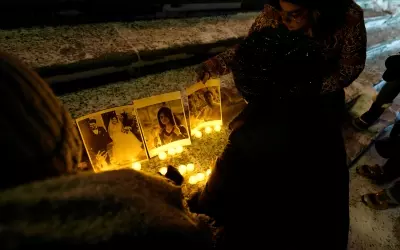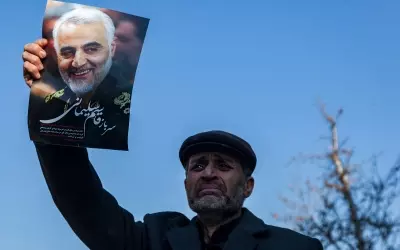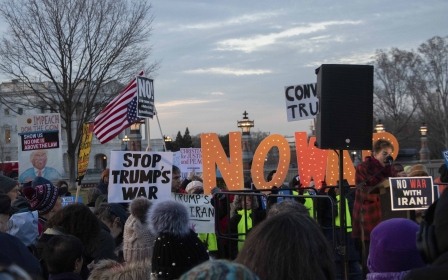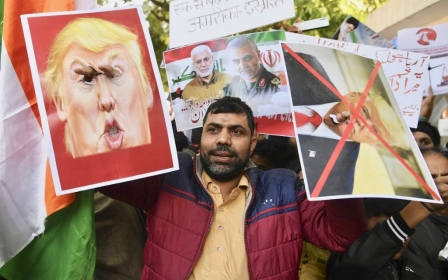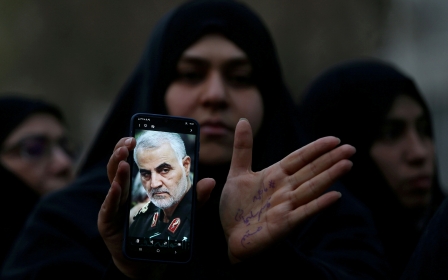'God has turned his back on us': Iranians in despair after two weeks of tragedy
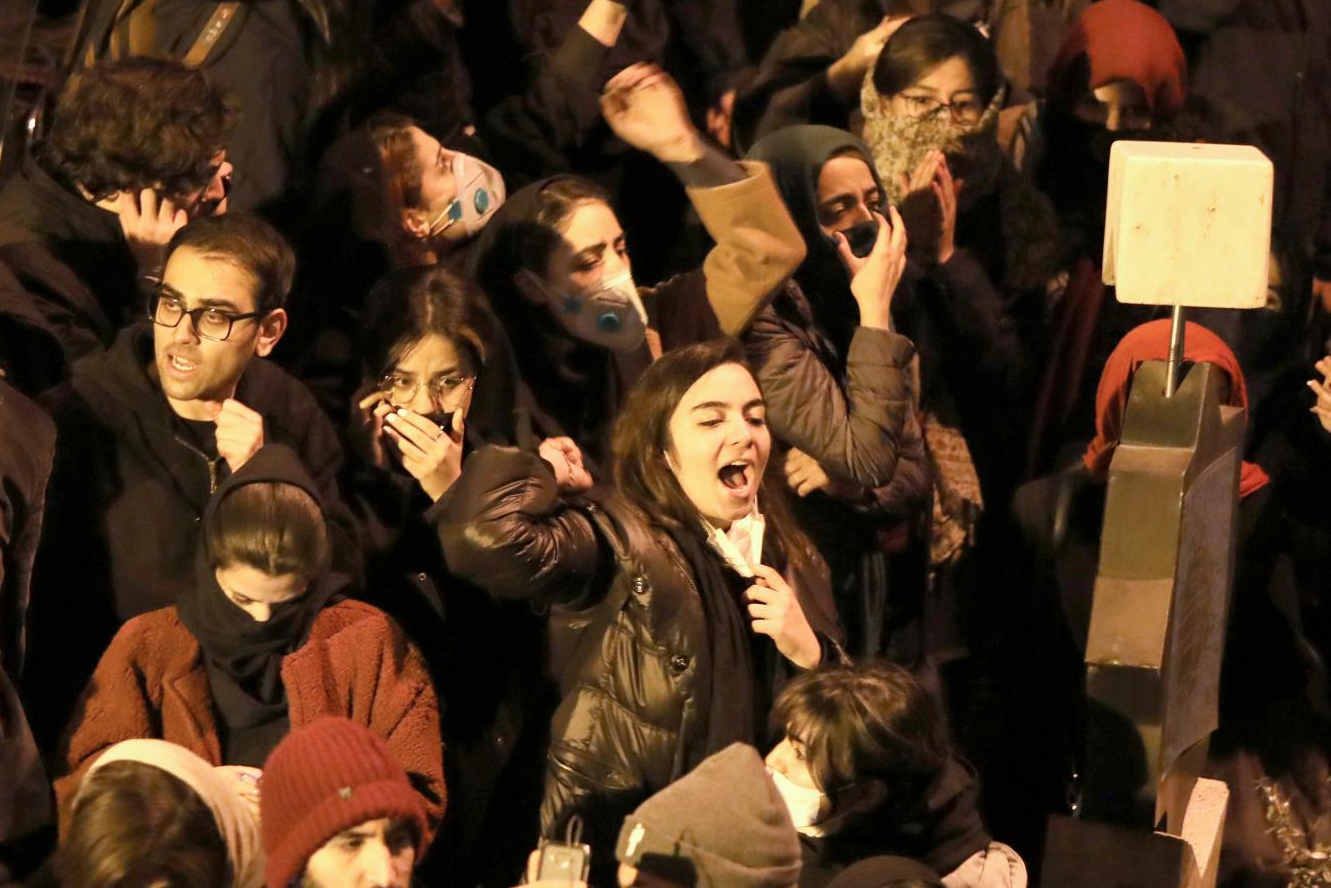
The loss of nearly 200 people in one plane crash would have been a disaster for any country, said Saeed*, a 39-year-old real estate agent working in Tehran.
But the downing of the Ukrainian passenger plane, which Iran’s Islamic Revolutionary Guards Corps later admitted to shooting accidentally with a missile, was only one among many tragedies for Iranians over the past two weeks.
First, there was the assassination of Qassem Soleimani on 3 January which ignited fears that the sanction-bitten country was on the brink of war with the US.
Then, at the funeral procession in his hometown of Kerman, at least 56 people were crushed to death in the huge turnout of mourners crowding the streets.
Three days later, a bus crash about 100 miles north of Tehran left 20 people dead. And three days after that, Flight PS752 came tumbling like a fireball out of the sky.
Now, after protesters poured into the streets on Monday for a third day in a row to express outrage over the government’s initial denial that it had shot down the plane, Saeed and other Iranians tell Middle East Eye they are in a state of despair.
“It’s like God has turned his back on us,” he said. “I don’t know why no positive change or thing occurs in Iran. We are frustrated by all the bad news we are hearing.”
'Days of lying'
Sohrab, a fitness instructor who has been protesting over the past few days in Tehran, says he is “fed up” with living under sanctions, “a government which is not responsible”, and angered by the way authorities handled the plane tragedy.
“I’m shocked by the volume of lies in the Islamic Republic. The supreme leader didn’t even bother to make an apology himself,” he said.
The IRGC aerospace commander who accepted responsibility on Saturday for the shooting down said he would “prefer to die rather than witness such an incident”, but remains in his role.
“Seemingly, they are willing to die, but not to leave their high-ranking positions,” Sohrab said.
'The Ukraine plane catastrophe destroyed the united front formed by the people in the face of US enmity and hostility'
- Shirin, psychology graduate
Kuroush, a 28-year-old software engineer, said it seems there is no end to sad days in the country - or the anger that has been sparked by the shootdown.
“I hope no one forgets the loss of a large number of our own people. The guilty officials must be held accountable,” he said.
“People are really angry with days of lying. However, the disclosure of their lies reminded us of the other terrible qualities of the establishment.”
Others, like Reza, a 35-year-old businessman who works in Tehran’s bazaar, said instead of condemning the country’s leadership over the shooting, they should be respected.
“I believe that the Ukraine plane was shot down mistakenly as it is impossible for the IRGC, which is fighting against Islamic State terrorists and the US, to kill its own fellow Iranians intentionally,” he said.
“The IRGC officials have courageously admitted to their grave mistake and we should embrace them.”
Unity destroyed
For Shirin, 26, a psychology graduate from the University of Tehran, the mood over the past two weeks has changed rapidly and is one that he said remains complicated.
“The martyrdom of General Soleimani, who was our hero, precipitated massive unity inside the country, but all is gone now,” he said.
“The Ukraine plane catastrophe destroyed the united front formed by the people in the face of US enmity and hostility. Now, we are witnessing angry protests.”
Shirin said Iran’s retaliatory attacks on two Iraqi military bases housing US troops last week was “bold”, but “not proportionate”. Meanwhile, the US president has scored politics points with his supporters.
“The assassination of Soleimani was a victory for Trump who was losing his white nationalist fans. He can now claim that he risked his presidency for what he allegedly says saved Americans from danger, which is not true,” he explained.
One more reason to leave
When Trump cancelled the nuclear deal with Iran and reimposed sanctions on the country in 2018, there was an outflow of young people from the country. The latest turbulence is yet another reason to leave, said some of the younger Iranians who spoke with MEE.
Mohammed, a computer programmer who was recently laid off as a result of the economic crisis, said he doesn’t see any future in Iran given both the sanctions and corruption “acting as an obstacle on our way to progress”.
“That’s why I’m now thinking of leaving Iran for Turkey to stay there for a short period of time and then immigrate to a European country, where I can find a job and have a relaxed life,” he said.
Siamak, 37, told MEE that he was an accountant in a private company, but lost his job when the sanctions returned and, since then, has been working as a taxi driver.
'Life has become very onerous. We can’t make ends meet'
- Hossein, lifeguard
“I have been collecting all the money I made in the past few months to pay a trafficker to help me bypass borders and reach Europe. I can’t drive anymore, I didn’t study for four years to give a ride to others and earn a small amount of money,” he said.
Some see a modicum of hope in this year’s US presidential elections, hoping Trump will lose and a new chapter of US-Iranian relations can begin.
Hossein, a lifeguard at a pool in southern Tehran, told MEE that he had worked long hours and saved up for 10 years in order to be able to buy a flat and get married.
But by the time he was actually in a position to buy the flat, prices had skyrocketed, turning a small apartment into a dream “for me and a lot of people like me,” he said.
“Life has become very onerous. We can’t make ends meet,” said Hossein.
“But I think things would become better if God helps and causes Trump to be miraculously defeated by his challengers, and Iran would then finally reach a deal with the US to overcome these destructive sanctions.”
*We are using only the first names of those interviewed to protect their safety.
Middle East Eye propose une couverture et une analyse indépendantes et incomparables du Moyen-Orient, de l’Afrique du Nord et d’autres régions du monde. Pour en savoir plus sur la reprise de ce contenu et les frais qui s’appliquent, veuillez remplir ce formulaire [en anglais]. Pour en savoir plus sur MEE, cliquez ici [en anglais].


